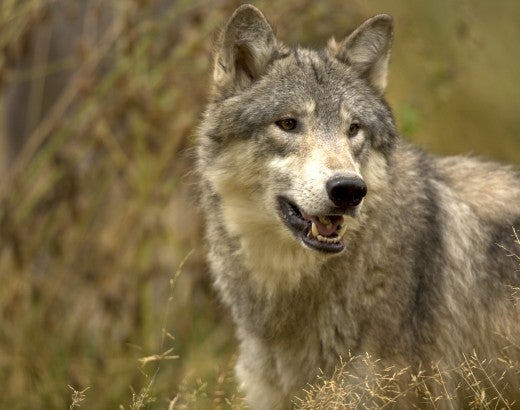Update (12/4/2020): Following our letter, the Wisconsin DNR announced today that it will not open a wolf hunt in January 2021, potentially sparing the lives of hundreds of wolves. But the state still plans to open a wolf season in fall 2021, and other states may follow suit. We will continue our fight in Wisconsin and other states to keep wolves out of the crosshairs of trophy hunters and to restore federal Endangered Species Act protections to these native American carnivores.
Wisconsin, which has a history of decimating its wolf population, is once again raring to open season on these animals soon after a federal rule stripping Endangered Species Act protections for wolves in the lower 48 states goes into effect in January.
At a September meeting of the Wisconsin Natural Resources Board, a governor-appointed group that sets policy for the state’s Department of Natural Resources, members pushed for a wolf hunt to occur immediately upon delisting and recommended bypassing the important step of letting state residents weigh in on the decision.
Today, the Humane Society of the United States sent a letter to Wisconsin’s Gov. Tony Evers, state lawmakers and Department of Natural Resources officials, stating that any attempt to begin a wolf hunt in early 2021 would be scientifically unsound and illegal.
According to Wisconsin law, a wolf trophy hunting season can begin only in November: a decision the state reached in 2016 after a great deal of debate. Any attempt to open a hunt in January or February or, indeed, any time before November 2021 would therefore be against the state’s own law.
If Wisconsin holds a hunt in January and February, when the state does its annual wolf population estimate, it would not only disrupt the population, but the state would be unlikely to have an accurate count of how many wolves are in the state in order to make decisions on hunting quotas. Wolves are also the midst of their breeding season during this time.
Wisconsin also needs to update its wolf management plan, which is more than 20 years old and badly outdated. The current plan would allow hunters and trappers to slash the state’s wolf population by 66%, allowing it reach an arbitrary and dangerously low population goal of just 350 wolves in the entire state. That number could drop even further because killing a single animal could lead to young pups, still dependent on their mothers, dying of starvation or predation. A recent Wisconsin-based study also found that allowing the trophy hunting and trapping of wolves can lead to an increase in poaching.
We already know that Wisconsin has shown no restraint or responsibility in the past when it comes to managing its wolf populations. Wolves were delisted in the state between 2012 and 2014 and trophy hunters and trappers went on a rampage during three wolf trophy hunting and trapping seasons. Of the 528 wolves killed, more than half were pups.
What’s more, the methods used to massacre these animals were especially cruel: more than two-thirds of wolves were killed using cruel, body gripping traps and strangling neck snares. Animals caught in traps can languish in these devices for hours and even days, sometimes suffering painful injuries, dehydration, starvation and exposure before they die or the hunter returns to shoot them. During the second and third seasons, wolf hunters in Wisconsin were allowed to use packs of GPS-collared hounds to chase down and corner wolves for an easy kill. This is not only dangerous and cruel for the wolves, but the hunting hounds too can be injured or killed when cornered wolves try to defend themselves and their families. We put a stop to this carnage with a lawsuit we won in 2014.
It would also be unwise for Wisconsin, or any other state, to rush into announcing wolf hunts based on the federal delisting, which, by itself, is premature and was made not in the best interests of wolves but as a handout to special interest groups, including gun lobbies and trophy hunters. Scientists have warned that the delisting is sure to cause irreversible damage. We and our coalition partners have already put the U.S. Fish and Wildlife Service on notice that we intend to file a lawsuit opposing the delisting rule and we are confident we will prevail because courts have regularly sided with us on this issue.
Wolf populations continue to be dangerously low all around the United States and these apex carnivores, so crucial to their ecosystems, now occupy only 15 percent of their historic range in this country. Wolves pose little to no risk to people, pets and farmed animals. Any fearmongering about the dangers posed by wolves is spread by those who want states to allow wolf hunting, and it was such fearmongering that led to their extirpation a century ago before they slowly began to make a return after they received federal protections in 1974.
Rather than dive head-first into an ill-considered decision, Wisconsin’s wildlife officials should take a step back and assess the tremendous risks associated with the indiscriminate trophy hunting and trapping of wolves. They also need to give residents the time and opportunity to weigh in on any wolf hunting proposals before finalizing them. By not doing so, and by blindly following the lead of the federal government in allowing trophy hunters and trappers to guide wildlife policy, they would be failing miserably at their job of serving the people of Wisconsin and protecting its precious wildlife.
If you live in Wisconsin, please watch our recent webinar on what the federal delisting decision would mean for wolves in Wisconsin, and how you can help. You can request our toolkit, “Protecting Wisconsin’s Wolves: A Guide to Protecting Wolves Following National Delisting,” by emailing us at wildlife@humanesociety.org. We’ve hosted similar webinars for advocates in the Great Lakes states of Michigan and Minnesota as well and have toolkits available.



